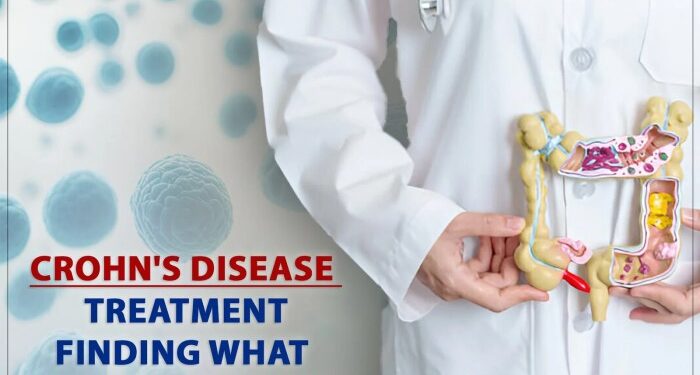Exploring the latest advancements in treating Crohn’s Disease in 2025, this introduction sets the stage for a fascinating discussion that delves into cutting-edge therapies and personalized approaches.
Providing insights into the challenges faced by patients and the evolving landscape of treatment options, this overview offers a glimpse into the future of managing this complex condition.
Overview of Crohn’s Disease
Crohn’s Disease is a chronic inflammatory condition that affects the gastrointestinal tract, leading to inflammation and damage to the digestive system. This condition can impact individuals of any age, but it is most commonly diagnosed in young adults. The exact cause of Crohn’s Disease is unknown, but factors such as genetics, immune system dysfunction, and environmental triggers are believed to play a role.
Symptoms of Crohn’s Disease
- Abdominal pain and cramping
- Diarrhea
- Weight loss
- Fatigue
- Bloody stools
Challenges in Managing Crohn’s Disease
Crohn’s Disease presents several challenges for patients in terms of managing their condition effectively. Some of the common challenges include:
- Flare-ups: Patients may experience periods of worsening symptoms, known as flare-ups, which can be unpredictable and disruptive to daily life.
- Dietary restrictions: Certain foods may trigger symptoms or aggravate inflammation, leading to the need for a restrictive diet.
- Medication side effects: The medications used to manage Crohn’s Disease can have side effects that may be difficult to tolerate for some patients.
- Mental health impact: Living with a chronic condition like Crohn’s Disease can take a toll on mental health, leading to anxiety, depression, and stress.
Current Traditional Therapies for Crohn’s Disease

Crohn's Disease is a chronic inflammatory condition of the gastrointestinal tract that requires long-term management. Traditional therapies are commonly used to control symptoms and reduce inflammation in patients with Crohn's Disease.
1. Aminosalicylates
Aminosalicylates are often the first line of treatment for mild to moderate cases of Crohn's Disease. These medications work by reducing inflammation in the lining of the intestines. Common examples include sulfasalazine and mesalamine.
2. Corticosteroids
Corticosteroids are used to reduce inflammation in moderate to severe cases of Crohn's Disease. While they are effective in controlling symptoms, long-term use can lead to serious side effects such as weight gain, osteoporosis, and increased risk of infections.
3. Immunomodulators
Immunomodulators like azathioprine and methotrexate are prescribed to suppress the immune system's response, thereby reducing inflammation in the intestines. These medications are typically used in patients who do not respond well to aminosalicylates or corticosteroids.
4. Biologic Therapies
Biologic therapies are a newer class of medications that target specific proteins in the immune system responsible for inflammation. Drugs like infliximab and adalimumab are commonly used in moderate to severe cases of Crohn's Disease. While effective, biologics can increase the risk of infections and may require regular monitoring.
Common Side Effects of Traditional Therapies:
- Nausea and vomiting
- Diarrhea
- Headaches
- Fatigue
- Increased risk of infections
Emerging Modern Therapies for Crohn’s Disease
With advancements in medical technology, there are new modern therapies being developed to treat Crohn’s Disease. These therapies offer innovative approaches that differ from traditional treatments, providing potential benefits in managing the condition.
Monoclonal Antibody Therapies
- Monoclonal antibody therapies target specific proteins in the immune system that are responsible for the inflammation seen in Crohn’s Disease.
- These therapies help reduce inflammation and suppress the immune response, leading to improved symptoms and reduced flare-ups.
- They are administered through injections or infusions, providing a targeted approach to treatment.
Stem Cell Therapy
- Stem cell therapy involves using stem cells to repair damaged tissues in the digestive system affected by Crohn’s Disease.
- These stem cells can help regenerate healthy tissue and reduce inflammation, potentially offering long-term benefits for patients.
- This therapy is still in the research phase but shows promise in providing a more sustainable treatment option.
Fecal Microbiota Transplantation (FMT)
- FMT involves transferring healthy bacteria from a donor’s stool into the gut of a patient with Crohn’s Disease.
- By restoring the balance of gut bacteria, FMT aims to reduce inflammation and improve symptoms of the condition.
- Research on FMT for Crohn’s Disease is ongoing, with some studies showing positive results in managing the disease.
Personalized Medicine Approaches
Personalized medicine in the context of Crohn’s Disease treatment involves tailoring medical decisions and treatments to individual characteristics of each patient. This approach takes into account factors such as genetics, environment, lifestyle, and other personal factors to customize the most effective treatment plan for each patient.
Benefits of Personalized Medicine for Crohn’s Disease
- More targeted and effective treatments: By analyzing individual factors, personalized medicine can help identify the most suitable medications and therapies for each patient, leading to better outcomes.
- Reduced side effects: Tailoring treatments to individual characteristics can help minimize the risk of adverse effects, as medications are selected based on a patient's specific profile.
- Improved patient compliance: When patients receive treatments that are personalized to their needs, they are more likely to adhere to the prescribed regimen, improving overall treatment success.
Examples of Personalized Medicine Strategies for Crohn’s Disease
- Genetic testing: Analyzing a patient's genetic makeup can help identify specific genetic markers related to Crohn’s Disease, guiding treatment decisions and predicting disease progression.
- Biomarker analysis: Assessing biomarkers in a patient's blood or stool samples can provide valuable information about disease activity, response to treatment, and potential complications, allowing for personalized interventions.
- Microbiome profiling: Studying the gut microbiome composition of patients with Crohn’s Disease can help personalize treatment plans by targeting the unique bacterial imbalance present in each individual.
Last Point
In conclusion, the landscape of Crohn’s Disease treatment is rapidly evolving, with promising modern therapies on the horizon. By embracing personalized medicine and innovative solutions, the future looks bright for patients battling this chronic illness.
Quick FAQs
What are the potential benefits of modern therapies for Crohn’s Disease in 2025?
Modern therapies offer the promise of improved symptom management, reduced side effects, and enhanced quality of life for patients.
How do personalized medicine approaches impact the treatment of Crohn’s Disease?
Personalized medicine tailors treatment plans to individual patients, increasing treatment efficacy and potentially reducing adverse reactions.
Are there any emerging technologies being developed specifically for Crohn’s Disease treatment?
Yes, advancements such as targeted drug delivery systems and precision medicine techniques are being explored to revolutionize the management of Crohn’s Disease.




